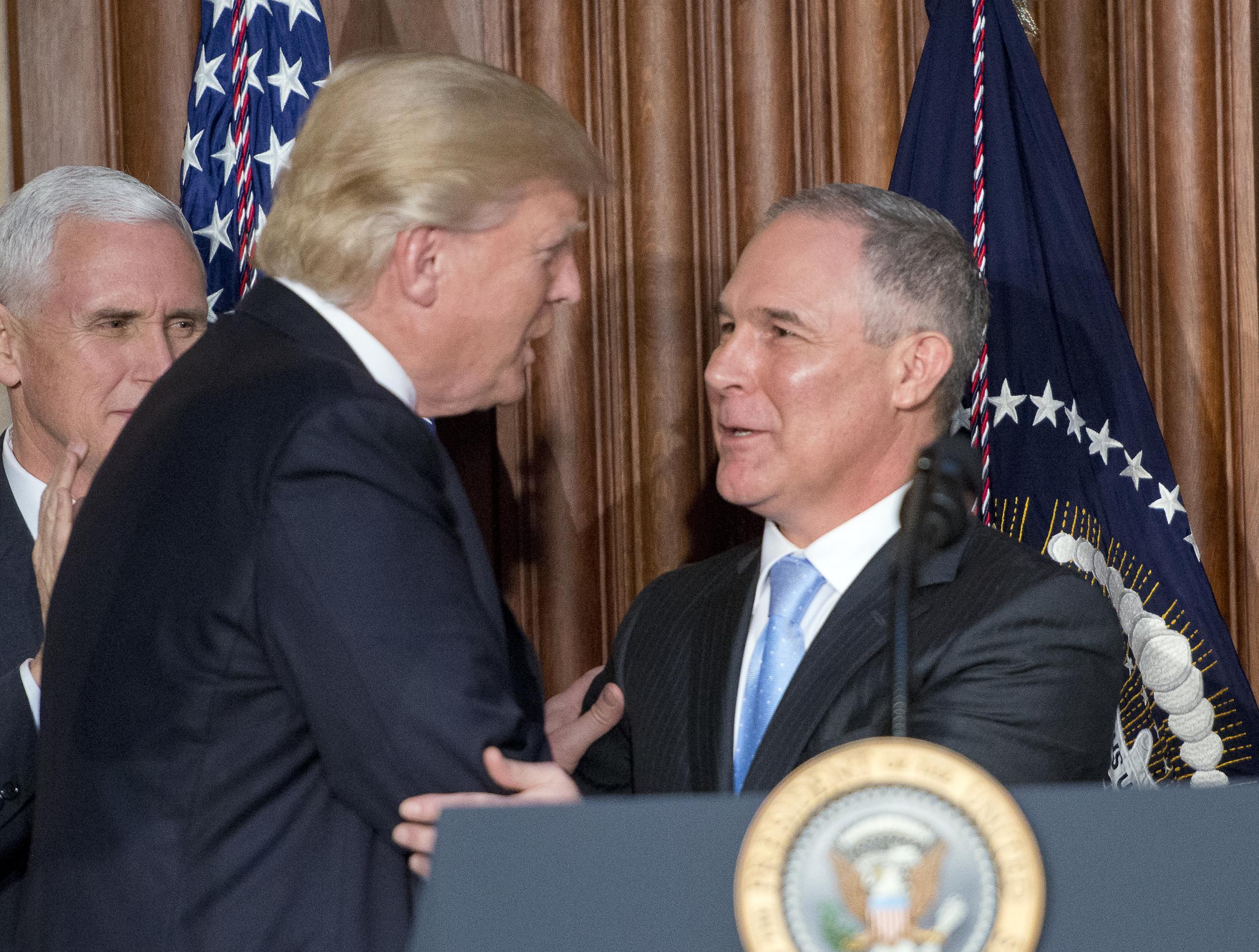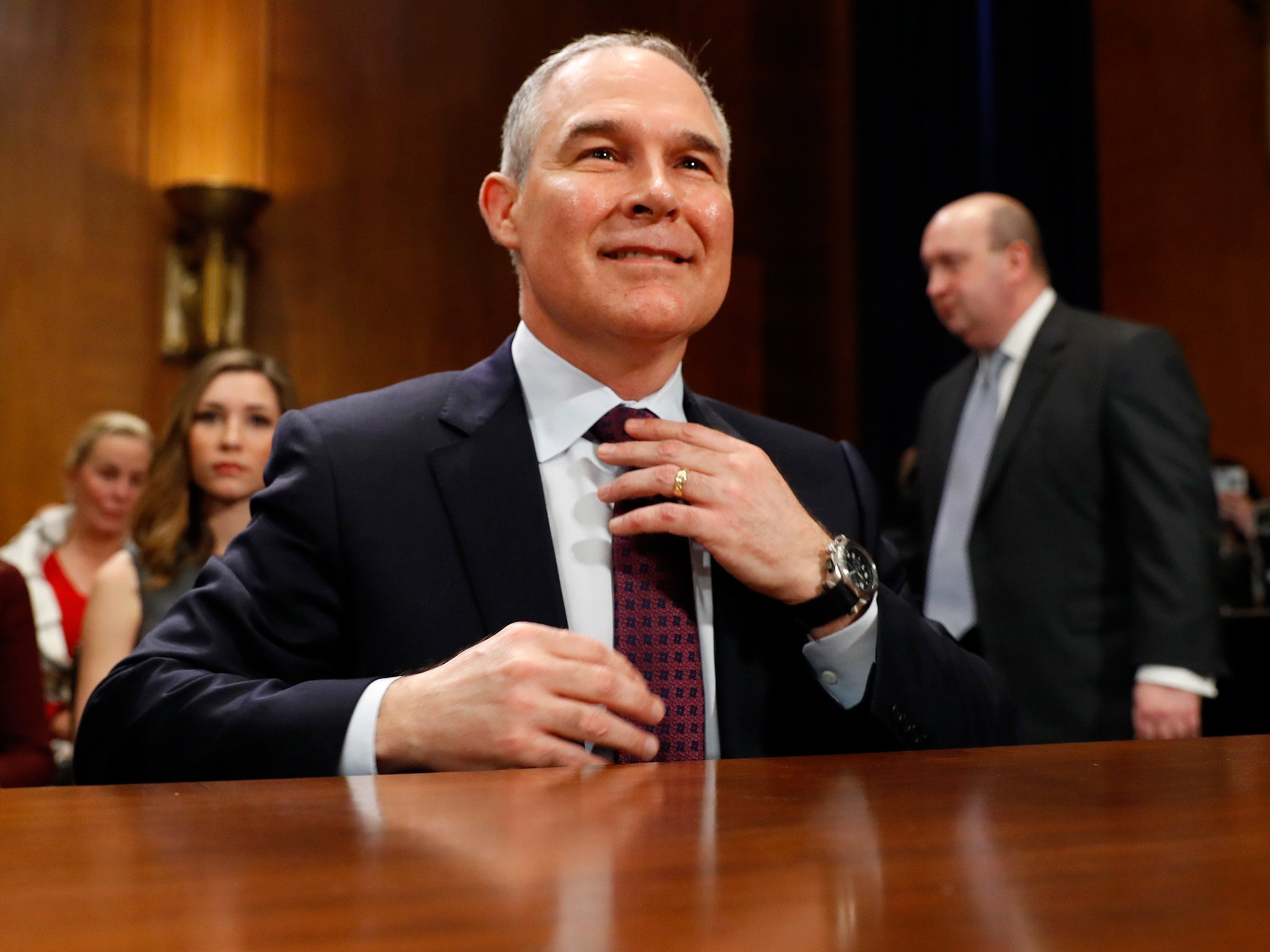EPA dismisses climate change scientists 'to replace them with industry reps'
'The administrator believes we should have people on this board who understand the impact of regulations on the regulated community'

Your support helps us to tell the story
From reproductive rights to climate change to Big Tech, The Independent is on the ground when the story is developing. Whether it's investigating the financials of Elon Musk's pro-Trump PAC or producing our latest documentary, 'The A Word', which shines a light on the American women fighting for reproductive rights, we know how important it is to parse out the facts from the messaging.
At such a critical moment in US history, we need reporters on the ground. Your donation allows us to keep sending journalists to speak to both sides of the story.
The Independent is trusted by Americans across the entire political spectrum. And unlike many other quality news outlets, we choose not to lock Americans out of our reporting and analysis with paywalls. We believe quality journalism should be available to everyone, paid for by those who can afford it.
Your support makes all the difference.The Environmental Protection Agency has dismissed at least five members of a major scientific review board, the latest signal of what critics call a campaign by the Trump administration to shrink the agency’s regulatory reach by reducing the role of academic research.
A spokesman for the EPA administrator, Scott Pruitt, said he would consider replacing the academic scientists with representatives from industries whose pollution the agency is supposed to regulate, as part of the wide net it plans to cast. “The administrator believes we should have people on this board who understand the impact of regulations on the regulated community,” said the spokesman, JP Freire.
The dismissals on Friday came about six weeks after the House of Representatives passed a bill aimed at changing the composition of another EPA scientific review board to include more representation from the corporate world.
President Donald Trump has directed Mr Pruitt to radically remake the EPA, pushing for deep cuts in its budget – including a 40 per cent reduction for its main scientific branch – and instructing him to roll back major Obama-era regulations on climate change and clean-water protection. In recent weeks, the agency has removed some scientific data on climate change from its websites, and Mr Pruitt has publicly questioned the established science of human-caused climate change.
In his first outings as EPA administrator, Mr Pruitt has made a point of visiting coal mines and pledging that his agency will seek to restore that industry, even though many members of both of the EPA’s scientific advisory boards have historically recommended stringent constraints on coal pollution to combat climate change.
Mr Freire said the agency wanted “to take as inclusive an approach to regulation as possible”.
“We want to expand the pool of applicants [for the scientific board] to as broad a range as possible, to include universities that aren’t typically represented and issues that aren’t typically represented,” he said.
Science advocates denounced the move as part of a broader push by the EPA to downgrade science and elevate business interests.
“This is completely part of a multifaceted effort to get science out of the way of a deregulation agenda,” said Ken Kimmell, the president of the Union of Concerned Scientists. “What seems to be premature removals of members of this Board of Science Counsellors when the board has come out in favour of the EPA strengthening its climate science, plus the severe cuts to research and development – you have to see all these things as interconnected.”
The scientists dismissed from the 18-member Board of Scientific Counsellors received emails from an agency official informing them that their three-year terms had expired and would not be renewed. That was contrary, the scientists said, to what they had been told by officials at the agency in January, just before Mr Trump’s inauguration.
“Most of us on the council are academic people,” said Ponisseril Somasundaran, a chemist at Columbia University who focuses on managing hazardous waste. “I think they want to bring in business and industry people.”
Courtney Flint, a professor of natural resource sociology at Utah State University who has served on the board since 2014, said she was surprised by the dismissal.
“I believe this is political,” said Ms Flint, whose research focuses on how communities respond to major disruptions in the environment, such as exposure to toxic pollution, forest fires and climate change. “It’s unexpected. It’s a red flag.”

Another of the dismissed scientists made his grievances public. “Today, I was Trumped,” Robert Richardson, an environmental economist at Michigan State University, wrote on Twitter. “I have had the pleasure of serving on the EPA Board of Scientific Counselors, and my appointment was terminated today.”
The board is charged with reviewing and evaluating the research conducted by the agency’s scientists. Those studies are used by government regulators to draft rules and restrictions on everything from hazardous waste dumped in water to the emissions of carbon dioxide that contribute to climate change.
Members of the board say they have reviewed the EPA’s scientific research on the public health impact of leaking underground fuel tanks, the toxicity of the chemicals used to clean up oil spills, and the effects of the spread of bark beetles caused by a warming climate.
A larger, corresponding panel, the 47-member Science Advisory Board, advises the agency on what areas it should conduct research in and evaluates the scientific integrity of some of its regulations.
Both boards, which until now have been composed almost entirely of academic research scientists, have long been targets of political attacks. Congressional Republicans and industry groups have sought to either change their composition or weaken their influence on the environmental regulatory process.
Lamar Smith, Republican chairman of the House Committee on Science, Space and Technology, wrote the House-passed bill intended to restock the Science Advisory Board with more members from the business world.
“In recent years, SAB experts have become nothing more than rubber stamps who approve all of the EPA’s regulations,” Mr Smith said at a House hearing in February. “The EPA routinely stacks this board with friendly scientists who receive millions of dollars in grants from the federal government. The conflict of interest here is clear.”
As a witness, Mr Smith brought in Kimberly White, senior director of chemical products and technology at the American Chemistry Council, which lobbies for chemical corporations and, like other industry groups, has pushed for more representation on the EPA’s science boards.
“We have also seen situations where peer reviewers have suggested discounting a study solely based on the funding source, without any considerations being given to the quality of the study,” Ms White said. “Also, EPA staff often comment throughout peer review meetings, essentially participating as peers, while industry experts are typically excluded from the dialogue.”
Several members of the Scientific Advisory Board said that they had not received dismissal notices, but that they were aware their board was a political target.
“I see the dismissal of the scientists from the Board of Scientific Counsellors as a test balloon,” said Joseph Arvai, an environmental scientist at the University of Michigan who is on the Scientific Advisory Board. “This is clearly very political, and we should be very concerned if it goes further.”
© New York Times
Join our commenting forum
Join thought-provoking conversations, follow other Independent readers and see their replies
Comments